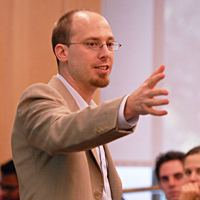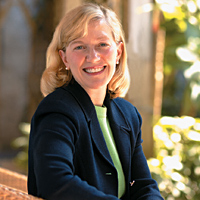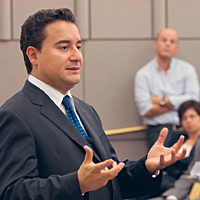Success
and fulfillment aren't just students' goals. In the Kellogg
School's unique academic culture, faculty thrive, too
By
Matt Golosinski
They
told him it couldn't be done, that teaching at a business
school was an academic dead end for a social psychologist
whose pedigree included a Princeton doctorate.
Before
Adam
Galinsky began his tenure at the Kellogg School in 2002
as an assistant professor of management and organizations,
some warned that the move spelled doom for his research aspirations.
"In
a business school you can't teach research," the naysayers
told him. "What students there want are war stories and
case studies."
| |
 |
| |
Professor
Adam Galinsky Photo
© Nathan Mandell |
| |
|
But
Galinsky, today the Morris and Alice Kaplan Professor of Ethics
and Decision in Management, says these stereotypes are unfounded
— at least at Kellogg, where intellectual depth and
experiential learning are integral, and where teaching and
research are complementary strengths. The school has proven
an engaging environment, for Galinsky and his students. He
has embraced the challenge of converting theory into valuable
practical tools and finds that his students respond well to
good research because they know how important it is for managers
to identify, interpret and predict patterns.
At
the same time, Galinsky's research into power dynamics, ethics
and negotiations has benefited by his classroom performance.
Even a one-off lecture he delivered during a Kellogg global
business course led him to consider the link between international
living experiences and creativity.
"I
never would have thought of the idea without the teaching,
and now my teaching is better because I've done this,"
he says.
Galinsky
has jumped on the bandwagon in the Kellogg School's decades-long
research approach to create knowledge that solves real problems.
When combined with the range of academic strengths at Kellogg,
graduates emerge ready to undertake challenges in many areas.
Ali
Babacan '92, minister of foreign affairs for the Republic
of Turkey, underscored this point during a recent visit.
"Kellogg
was crucial in my career and life," said Babacan, a former
student of Dean Dipak
C. Jain. Babacan said the education propelled his success
in business and politics. "Management is a global concept
Š for any situation and setting," he said, adding that
the diverse Kellogg student body and the school's team-oriented
philosophy offered him great benefits.
Today,
he is a key player negotiating Turkey's accession to the European
Union and says that government is an arena where MBAs can
have impact. "Knowledge we learn at Kellogg is applicable
to many different fields; [this education offers] many tools
that open many doors," said Babacan.
Turning
ideas into action
Throughout
her career, including roles as president and CEO of Kraft
Foods Inc. and, today, as senior adviser to McKinsey and Co.,
Betsy Holden '82 has tapped her Kellogg knowledge and
network. Her marketing education began with an "unbelievable
all-star team" of professors like Brian
Sternthal, Philip
Kotler, Bobby
Calder and Sidney
Levy. Sternthal's advertising class, along with Lakshman
Krishnamurthi's marketing research course, remain highlights.
| |
 |
| |
Betsy
Holden '82 Photo ©
Todd Rosenberg Photography |
| |
|
| |
 |
| |
Ali
Babacan '92 Photo
© Nathan Mandell |
| |
|
"Sternthal's
class really prepared us for the things we would be doing
after graduation. It wasn't just advertising, but offered
a broader perspective and a lot of brand management fundamentals,"
says Holden, who sits on the Dean's Advisory Board.
As
a Kellogg student, she participated in the General Motors
Marketing Competition. Her team won. "There were about
25 of us and we worked with most of the Marketing Department,
though the effort was student driven. It was an incredible
educational experience," she recalls, adding with a laugh
that the professors told students "win or don't come
back."
After
graduation, Holden continued winning, counting among her successes
the launch of DiGiorno Rising Crust Pizza for Kraft in 1995.
She called the experience "a textbook example" of
applying marketing theory and executing it extremely well.
She had learned the frameworks at Kellogg more than a decade
earlier, proving, she says, "this education has staying
power."
"I
used all the principles we learned about market structure,
creating a new brand, positioning, order entry." Holden
also sought advice from faculty members during the launch.
Since then, she has returned to Kellogg nearly every year
to talk to students and professors, sharing challenges facing
practitioners. She even turned the DiGiorno experience into
a case study that she presented during marketing Professor
Alice
Tybout's executive education course.
"It
showed how all the pieces came together in terms of pricing,
positioning and new product strategy," says Holden, who
tells students and alumni to maintain a lifelong relationship
with Kellogg. "Get everything you can out of the Kellogg
experience, but be prepared to give back too," she says.
Holden continues doing so: She was an Executive in Residence
last year and is helping lead a Kellogg Innovation Network
(KIN) summit in November, an event that includes alumni, members
of the Dean's Advisory Board and corporate partners.
"I
think people should stay involved with the school," she
says, "because all of us would say that Kellogg played
an incredibly important role in our lives and in our business
success."
Next
page: Entrepreneurial approach
yields distinction
1 | 2 | 3 |



